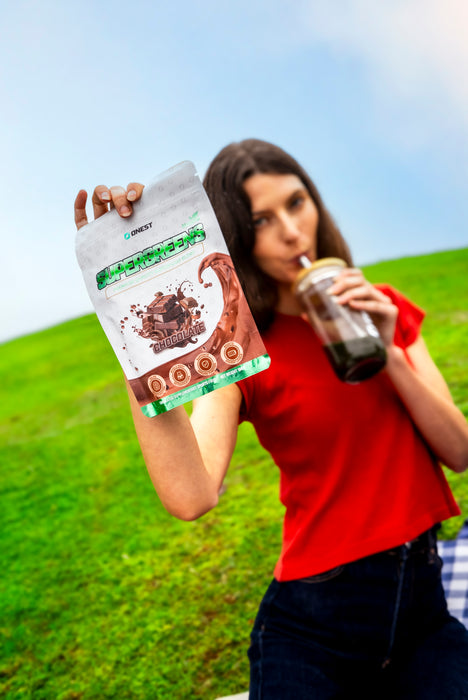BUILDING BETTER EATING HABITS TO ACHIEVE YOUR WEIGHT LOSS GOALS
It's easy to imagine yourself two-stone lighter and in enviable shape...
Your love handles have melted away, your six pack is pumping, and your waistline has slimmed to reveal the perfect shape…
You feel confident, gorgeous and strong.
Imagination, especially visualization, is useful. But in reality transforming your physique is a journey that takes time and effort. Maybe surprisingly, though, this effort doesn't need to be forced, gruelling or littered with boredom.
Weight loss and a svelte silhouette begin with building better eating habits, not strict diets and bootcamp regimes.
How to build better eating habits to achieve your weight loss goals?
According to an article published by the University of Michigan, “Roughly 90 percent of people who lose a lot of weight eventually regain just about all of it.” We believe that when people follow a strict diet only, they cling to deprivation and determination. This can only last so long. Instead, a focus on developing healthy eating habits will help you to achieve and sustain a stable weight.
Here are our top 6 tips…
Focus on complete meals
Incorporate meals that contain ample micro and macronutrients. This provides the sustenance needed to function well and the nutrients required to shed excess pounds. A meal that contains healthy fat, complex carbohydrate, and protein is filling, quells hunger, kills craving, and moderates blood sugar level. Think poached eggs, sliced avocado, a side of beans, wilted spinach, with grilled mushroom and tomatoes.
Let’s break this down...
Healthy fat
For years, we were advised to reduce fat intake. Yet as fat consumption decreased and carbohydrates stepped in to fill the void, obesity rates exploded. While science has now developed a healthier understanding, the consistent indoctrination has ensured mistruths still persist. Namely, that all fat is bad (it’s not)!
So you might be surprised to discover that the World Health Organization recommends fat ought to consist of between 20 and 35% of your total calorie intake. The minimum is to “ensure adequate consumption of total energy, essential fatty acids, and fat-soluble vitamins.”
Why does this matter to your waistline?
Essential fatty acids like those found in fish oil have been linked to weight loss. One study showed that EFA supplementation boosted fat loss. This appeared due to an increase in the body’s ability to burn fat as energy.
Complex carbohydrates
One carbohydrate is not equal to the next. Understanding the difference between complex and simple carbs matters.
A complex carbohydrate is formed by a long string of connected sugars. These are found in healthy-weight promoting foods.
Simple carbohydrates contain one or two connected sugars. This means they’re easy to digest and readily available to use or store. These sugars are often added to foods to enhance flavor.
Complex carbs provide nutrients and quell hunger; simple carbs promote overweight and obesity.
Choose complex carbohydrates like beans, chickpeas, corn, lentils, oatmeal, peas, and vegetables. Avoid simple carbs like those found in pastries, candy, soda and, often, in low-fat foods.
Tip: Opt for low glycemic load options.
Lean protein
As the article, Revisiting the role of protein-induced satiation and satiety, said:
Protein is the most effective food macronutrient providing a satiating effect. Thus, formulating foods with increased protein contents can help to modulate food intake, promoting body weight loss and body weight maintenance thereafter.
In short, protein fills you up for longer, promoting a lower calorie intake. This can aid weight loss without feelings of deprivation.
Opt for smaller plates
Have you ever considered harnessing the power of optimal illusion in your quest for a slimmer frame?
A 2017 study asked people to rate photographs of ten different dishes that were either positioned on a small or large plate. When people were shown images on the small plate, they estimated higher satiation (“fullness") and reduced food intake.
It seems that switching your large dinner plates for a smaller version might have a positive impact on body size.
Practice mindful eating
How often do you munch on snacks while watching TV or gulp down lunch while you work?
Not being fully aware may result in overeating. Instead, mindfulness puts conscious decision making back in your hands.
What is mindful eating?
As an article published in the American Journal of Lifestyle Medicine said, it's “a nonjudgmental acceptance of physical and emotional feelings while eating or in an eating environment.”
The practice enables you to recognize that you've eaten enough and to stop, empowers you to choose the foods you consume, encourages you to be present, and may reduce emotional and general overeating. This is wonderful for weight loss!
Enjoy a pre-meal glass of water
One of the cornerstone’s of weight loss is a reduction in calorie intake. But we, humans, recoil at long-term deprivation. So how can we achieve the former and avoid the latter?
Drinking 17 fl oz (500 ml) of water before consuming a meal reduces calorie consumption. After some time, this adds up. Research shows those who follow this practice shed more weight than those who don't.
Adhere to intermittent fasting
There's a good chance you've heard of intermittent fasting (IF) by now. The practice has achieved widespread popularity in past years. It’s power is in its simplicity.
What is IF?
Instead of focusing on what you eat, you prioritize when you eat. Two common approaches are daily or weekly fasts.
You may choose a daily IF protocol; 16-8 is a well-liked choice. This means your fasting period — when you do not eat — lasts for 16 consecutive hours. Then, in the remaining eight hours you enjoy your meals as usual. Because this is a daily practice, it's easy to incorporate into your usual routine.
You may opt for a weekly convention where you schedule a 24-hour fast every week. For example, your fast might start after breakfast on a Wednesday and finish in time for Thursday's lunch.
The systematic review, Intermittent fasting and weight loss, found IF resulted in weight loss of between 0.8% to 13.0%. Body mass index (BMI) decreased. Waist circumference dropped. Importantly, the majority of weight lost with IF was fat.
Intermittent fasting can deliver fat loss results that are equivalent to standard dieting... Without feeling stuck on a never ending diet!
The authors said, “Intermittent fasting shows promise for the treatment of obesity."
Supplement with HyperBurn
Science-backed supplementation is a hack many of our customers use (and love) to achieve and maintain an enviable body.
An effective appetite suppressant that increases your ability to burn fat, HyperBurn puts you firmly in control. With zero-calories it’s ideal for intermittent fasting as this potent product will not break your fast.
HyperBurn shortcuts the journey to a new body, or may magnify your current physique. Choose from one of our three delish flavors and experience the difference!






